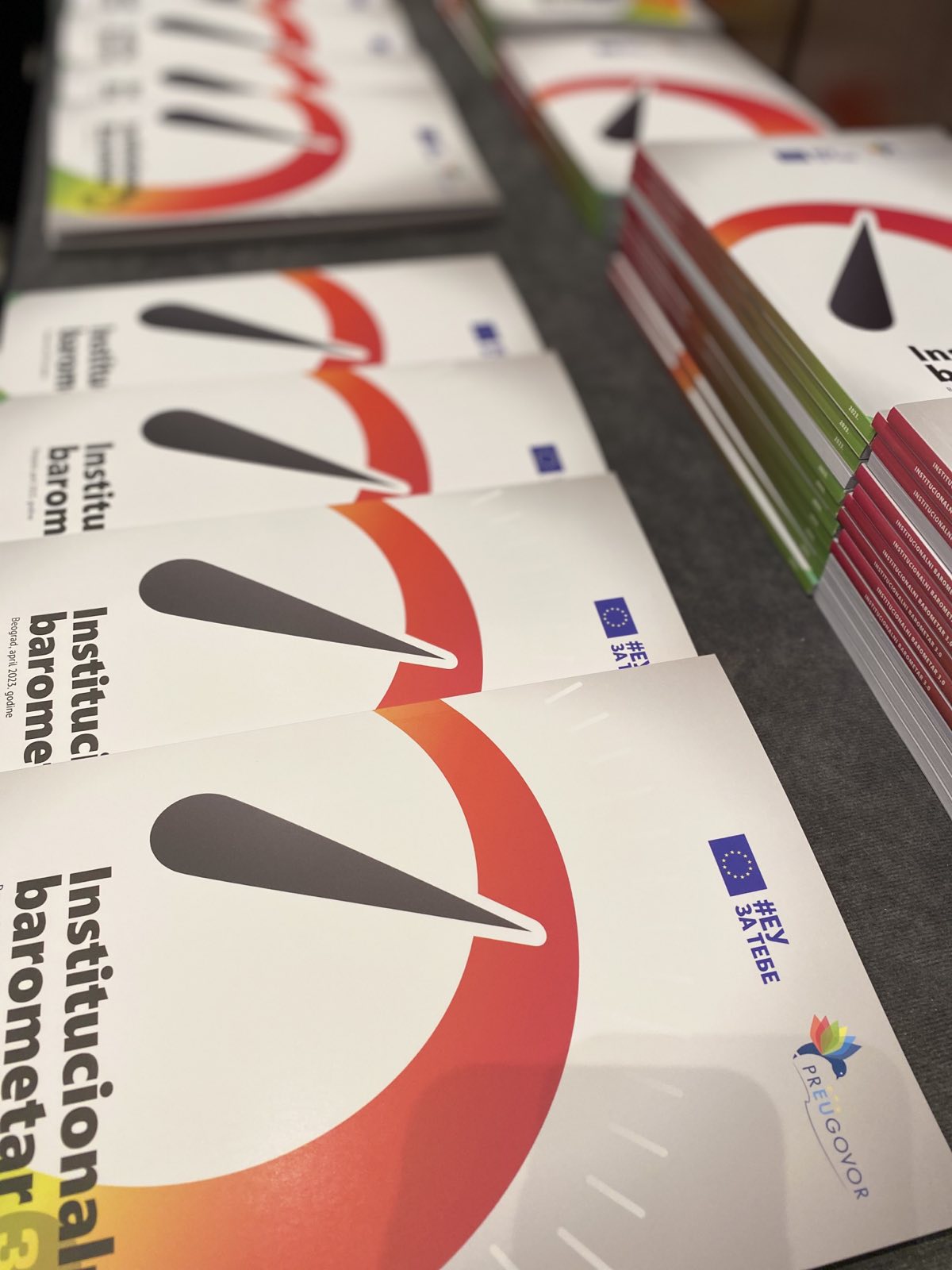Key obstacles to the effectiveness of independent institutions are insufficient capacities and the attitude of the executive and legislative authorities towards them. This was concluded at the presentation of the "Institutional Barometer 3.0" of the prEUgovor coalition on April 20 at the Metropol Palace Hotel in Belgrade.

"The basic question we ask is how institutions do their work." We need to look at the state and results of the reforms beyond the technical items of the action plans," said Jelena Pejić Nikić, coordinator of the prEUgovor coalition and senior researcher at the Belgrade Center for Security Policy. She emphasized the importance of to what degree citizens have confidence in the processes led by the institutions.
Gerhard Zalzer, from the EU Delegation to Serbia, used his introductory presentation to emphasize that democracy is impossible without independent institutions and that strong and independent institutions are a necessary prerequisite for democracy and the key to the fight against corruption.
Dušan Šabić, the editor of the Institutional Barometer 3.0, pointed out that this publication represents a continuation of the persistent work of the prEUgovor coalition in the desire to contribute its findings to reforms and concrete changes in the field by applying the original methodology. "Measuring institutional efficiency is an essential element of assessing the state's efforts to achieve specific goals because effective institutions are a prerequisite for the successful implementation of specific measures and policies." This is especially important in areas that are difficult to measure, such as the corruption level.
For the first time, we measured the effectiveness of six local institutions
Ivan Radojević, the editor of the Local Institutional Barometer, explained that the Local Institutional Barometer implementation started because reforms are often more visible at the local level.
The local institutional barometer includes the work of six institutions at lower levels of government: Provincial Citizens' Ombudsman - Ombudsman, Anti-Corruption Mechanisms of the City of Novi Pazar, Shelter for Women and Children Threatened by Family Violence "Safe Women's House" at the Center for Social Work of the City of Novi Sad, Higher Public Prosecutor's Office in Užice, Migration Council of the City of Subotica and Security Council in Požega.
"Local institutions were not chosen by chance. We selected them so they have similar roles as the institutions that were monitored at the central level", stated Radojević and emphasized that it is more difficult to obtain data on the work of institutions at the local level.
The topic of the first panel was the reforms within Chapter 23, that is, the fight against corruption and the protection of fundamental rights.

There is no improvement in the work of the Agency for the Prevention of Corruption
Zlata Đorđević, the Transparency Serbia researcher, stated that the problems in the work of the Agency for Prevention of Corruption, despite small steps forward, are still unchanged and that the lack of personnel and material resources remains the main problem. As part of the problem, he cites the way the directors are elected in all independent institutions. "Employees in the Agency have enough knowledge and can do their job, but the leadership and the political climate are such that only what is strictly stated in the law is implemented." "The agency does not act proactively and does not use all the possibilities that the law offers," Đorđević stressed.
Dušan Šabić, on behalf of the Center for Applied European Studies, presented findings on the work of the Commissioner for Information of Public Importance and Personal Data Protection (Commissioner).

The effectiveness of the Commissioner is undermined by the non-responsiveness of other competent authorities
"The Commissioner's institution managed to maintain a high level of efficiency. There is progress in terms of human capacity and new powers. However, violators of both laws that the Commissioner protects still often go unpunished, which creates an extremely bad image and sends a bad message. The attitude of other institutions towards the Commissioner is a key problem that must be urgently changed for the Commissioner to show citizens that he can protect their rights", concluded Šabić.
Lela Rudić, from the office of the Commissioner for Information of Public Importance and Protection of Personal Data, believes that it is good and healthy for institutions to be under public scrutiny.
"The Commissioner is in charge of raising awareness and has numerous roles through various activities, ensuring that the authorities fulfill their obligations and that those seeking information can exercise their rights without delay," emphasized Rudić. She also pointed to the practice of abusing the right to free access to information, the goal of which is financial gain. In terms of personal data protection, she expressed her concern that rights and obligations in this area are being circumvented by special laws. As an example, she cited the December 2022 Draft Law on Data Processing and Records in Internal Affairs.
